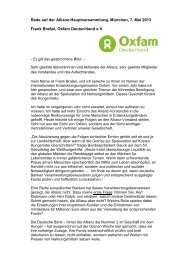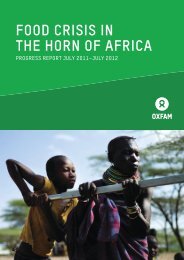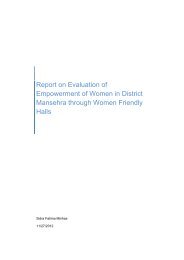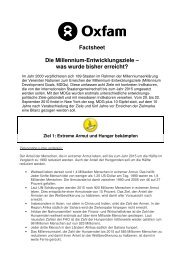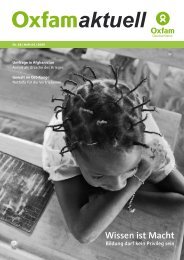shape - Oxfam
shape - Oxfam
shape - Oxfam
Create successful ePaper yourself
Turn your PDF publications into a flip-book with our unique Google optimized e-Paper software.
4. Sustaining behaviour change.<br />
SHAPE’s Gender, Masculinities<br />
and HIV project is designed to<br />
facilitate attitude and behaviour<br />
change among students around<br />
gender equality, women’s<br />
empowerment and HIV and AIDS.<br />
SHAPE recognises that while the<br />
masculinities and assertiveness<br />
training workshops may trigger<br />
the behaviour-change process,<br />
they will not bring about<br />
sustainable behaviour change<br />
unless complemented with other<br />
longer-term strategies. As such,<br />
the project has a strong posttraining<br />
component which is<br />
dominated by student-initiated<br />
and student-managed activities.<br />
These follow-up activities provide<br />
opportunities for male and female<br />
students to process newly-learned<br />
concepts and practise new<br />
attitudes, behaviours and skills<br />
with other students. Furthermore,<br />
these activities provide a platform<br />
for students to advocate for<br />
gender equity within campus life.<br />
Part of the way SHAPE<br />
measures its effectiveness is<br />
by the number of post-training<br />
activities students organise<br />
and the number of female and<br />
male students actively involved<br />
in the planning, organising and<br />
implementation of these activities.<br />
It is also through the post-training<br />
activities that female and male<br />
students are able to influence and<br />
determine the agenda of SHAPE’s<br />
intervention. For example, it is the<br />
students who come up with topics<br />
for discussion at talk shows and<br />
seminars; it is also the students<br />
who decide on the approach to<br />
be used to disseminate<br />
information to the different groups<br />
on and off campus. The benefit of<br />
taking this approach is that<br />
students often come up with<br />
unconventional, innovative and<br />
bold ways of talking about gender<br />
and HIV which appeal to their<br />
peers and other young people.<br />
The post-training strategies take<br />
many forms — pressure groups,<br />
seminars, events and edutainment<br />
activities — which the students<br />
design to engage their peers in<br />
discussions on gender equality<br />
and HIV and AIDS. The activities<br />
include:<br />
• dialogue sessions or “talk<br />
shows” on gender and HIV<br />
and AIDS issues in MSU<br />
residence halls;<br />
• a regular newsletter<br />
Shaping Times which is<br />
also printed in Braille form.<br />
• a gender and HIV<br />
awareness gala;<br />
• a HIV network comprising<br />
male and female peer<br />
educators who lead small<br />
mixed-sex groups which<br />
discuss gender and HIV<br />
issues in an informal setting;<br />
• student-produced fact sheets<br />
on gender equality, HIV, stigma<br />
and discrimination and coping<br />
with rape;<br />
• action-orientated clubs such as<br />
Students Against Drug and<br />
Substance Abuse, SHAPE<br />
Drama Association and Culture<br />
Society that address<br />
underlying causes of HIV<br />
infection among students such<br />
as substance abuse, financial<br />
stress and peer pressure; and<br />
• events such as sporting<br />
events, quiz shows,<br />
talent shows and<br />
advocacy campaigns.<br />
One student initiative involved<br />
a march in the Gweru city centre<br />
to protest against the high rates<br />
of child sexual abuse in the<br />
local community. The march<br />
brought together more than<br />
2,500 members of the Gweru<br />
community, including police, social<br />
workers and representatives from<br />
child rights organisations, and was<br />
considered a resounding success.<br />
Another student-organised activity<br />
was a secondary schools’ theatre<br />
arts festival that was spearheaded<br />
by the SHAPE Drama Association.<br />
Five secondary schools in<br />
Midlands province participated<br />
in the festival by writing and<br />
performing a play which promoted<br />
gender and HIV and AIDS issues.<br />
The winning school was judged<br />
on the extent to which these<br />
issues were addressed in its play.<br />
More than 300 secondary school<br />
students and their teachers<br />
attended the festival.<br />
LEFT: SHAPE members discuss how they<br />
will promote an upcoming event designed<br />
to increase awareness among students<br />
about gender violence. Photo: William<br />
Nyamuchengwa/<strong>Oxfam</strong>AUS.<br />
SHAPE realised that its project<br />
was not reaching “differentlyabled”<br />
students (students with<br />
disabilities) on campus due to<br />
a lack of accessible information<br />
and their non-participation in<br />
campus social activities. This lack<br />
of information, coupled with<br />
misconceptions and myths about<br />
people with disabilities<br />
and an absence of targeted<br />
interventions, makes “differentlyabled”<br />
students extremely<br />
vulnerable to HIV infection.<br />
To counteract this, SHAPE<br />
established a partnership<br />
with the university’s Disabilities<br />
Resource Centre to produce<br />
literature on gender and HIV<br />
issues in Braille for visuallyimpaired<br />
students. It is also<br />
advocating for condom<br />
instructions and information<br />
on sexually-transmitted infections<br />
and healthy living be made<br />
available in Braille, so that<br />
visually-impaired students<br />
can access services and<br />
information to reduce their<br />
vulnerability to HIV infection.<br />
SHAPE has also held two “talk<br />
shows” to highlight the views<br />
of “differently-abled” students<br />
on gender and HIV issues.<br />
Students with disabilities<br />
indicated a lack of assertiveness<br />
in intimate relationships because<br />
of their physical limitations and<br />
marginalisation by other students.<br />
As one visually-impaired female<br />
student said: “…if a guy<br />
approaches me and proposes<br />
[sex] and I know he can see,<br />
I will love him because I consider<br />
myself lucky to even have a<br />
boyfriend.” Of particular<br />
concern was the myth that<br />
sexual intercourse with a<br />
visually-impaired person<br />
could cure AIDS.<br />
SHAPE’s MSU Program Manager<br />
Leo Wamwanduka notes that<br />
gender and HIV issues are very<br />
complex among students with<br />
disabilities. “Male students with<br />
disabilities often feel frustrated<br />
because their physical limitations<br />
force them to depend on others<br />
and deny them the opportunity<br />
to partake of ‘manly’ activities.<br />
Therefore, they are not seen<br />
as ‘man enough’ in their peer<br />
circles. It is also difficult for<br />
female students to be truly<br />
assertive when they have to<br />
rely on others for their upkeep<br />
while on campus.”<br />
Despite these challenges, SHAPE<br />
promotes an approach that calls<br />
on all students to work together<br />
on gender and HIV behaviour<br />
change strategies, regardless<br />
of their physical abilities. SHAPE<br />
recognises that its interventions<br />
IN PROFILE<br />
Including differently-abled students<br />
SHAPE is reaching out to students<br />
with disabilities as part of its HIV<br />
and HIDS and gender work”<br />
must fully cater for students with<br />
disabilities and that it must devise<br />
specific strategies to reach them.<br />
One student-initiated activity was<br />
a sports gala for students with<br />
disabilities from MSU and the<br />
University of Zimbabwe. The<br />
gender-and-HIV-themed gala<br />
had two parts — the first involved<br />
sporting events such as goal ball,<br />
soccer and shot-put, while the<br />
second was a one-day workshop<br />
in which students with disabilities<br />
examined the unique ways in<br />
which they are affected by<br />
gender inequality and HIV<br />
and AIDS.<br />
OF PARTICULAR<br />
CONCERN WAS THE<br />
MYTH THAT SEXUAL<br />
INTERCOURSE WITH<br />
A VISUALLY-<br />
IMPAIRED PERSON<br />
COULD CURE AIDS.<br />
TOP: SHAPE gender activists Johanes Marufu<br />
and Carter Capwanya discuss the bridges of<br />
hope tool for educating fellow students about<br />
HIV stigma and discrimination. Photo: William<br />
Nyamuchengwa/<strong>Oxfam</strong>AUS.<br />
20 21


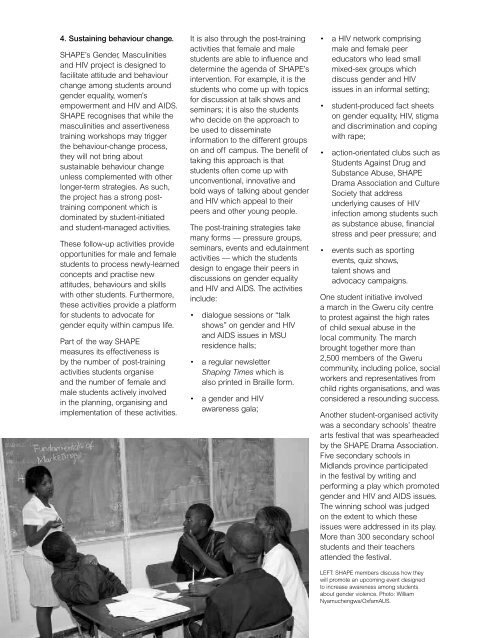

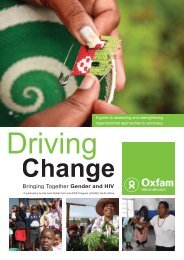

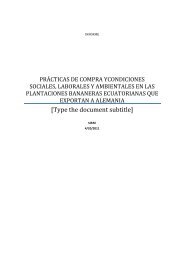
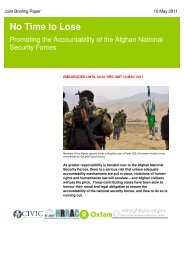
![Download: Faltposter EU-Handelspolitik [PDF 2,17MB] - Germanwatch](https://img.yumpu.com/25095854/1/190x161/download-faltposter-eu-handelspolitik-pdf-217mb-germanwatch.jpg?quality=85)
